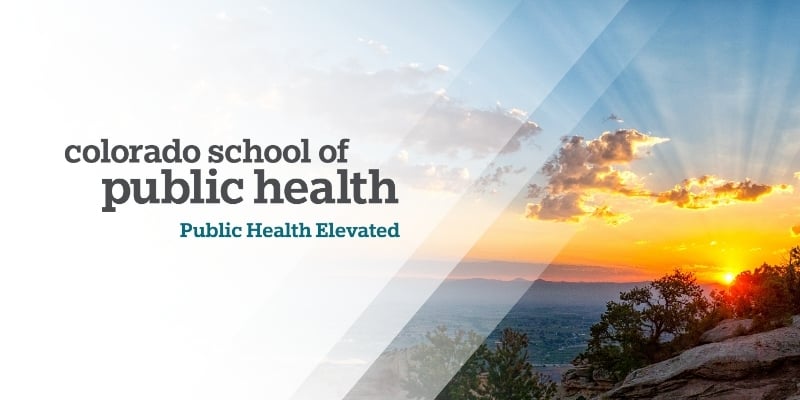The first students in the Colorado School of Public Health at Colorado State University’s Bachelor of Science and Master of Public Health dual degree program are graduating this spring and summer. In a partnership with the Colorado School of Public Health, CSU offers a combined BS/MPH degree program to earn the combined degrees in five years, meaning it takes a full year less than it would take to complete the two degrees separately. The program’s first graduate, Katey Schuster, joined the program during her junior year of college in 2021.
“It was kind of crazy, being in a world where COVID-19 was at its peak on top of this being a brand new program,” said Schuster.
Brandon Martinez-Garcia, who majored in Health and Exercise Science, shared a similar sentiment on getting involved with public health.
“I started this program as a sophomore, and I didn’t really know what public health was at the time,” said Martinez-Garcia. “But with me being an immigrant, I always knew I wanted to give back to the Latinx community and one of the ways I found myself being able to do that was through research. As an immigrant, I can’t vote. I feel like I don’t have a say in policies, programs, or politics. And so I feel like the only way I could ever voice what I believe is by demonstrating it through empirical data. I think that data gave me a voice that allows me to be at the table where normally someone with my identities wouldn’t be there.”
Schuster graduated from CSU with an undergraduate degree in Human Development and Family Studies in 2023 but realized in her sophomore year of college that the medicine track she was previously heading toward was not meant for her.
“I realized I didn’t want to be a doctor,” said Schuster. “I didn’t want to go to medical school, I didn’t want to do anything with the hard science where my degree was heading. It’s just not what I wanted to do. I knew that I liked helping people and I liked interacting with the public and I liked infection prevention and disaster relief and all these things—but then the program sort of fell into my lap.”
Schuster’s undergraduate academic advisor introduced her to the new 4+1 program being offered at CSU, where individuals in their sophomore or junior year of their undergraduate program enrolled in select majors (Biological Science, Biomedical Sciences, Health and Exercise Science, Human Development and Family Studies, Nutrition and Food Science, Psychology, or Zoology) are eligible to apply for the combined curriculum. Martinez-Garcia’s advisor also recommended the program to him.
“I had a really great advisor, Tami Boday,” Martinez-Garcia said. “She’s the one who introduced me to the public health program after I told her what I wanted to do and what my end goals were. She sat me down and was like, ‘You should really look into this’.”
The biggest appeal of the program for both Schuster and Martinez-Garcia was the reduced cost of earning undergraduate and master’s degrees.
“I knew I was going to get an advanced degree of some sort to do almost anything I wanted to do,” said Schuster. “The program was just a really fast, easy, cheaper option, and to be able to get some of those classes in and know what I was getting into before I was fully involved in the MPH program was really attractive to me.”
“The program worked perfectly for me because while you’re in the BS program, you’re going at tuition rates for undergraduate costs even for the graduate MPH courses you take, so you end up saving a lot of money,” said Martinez-Garcia. “For me, grad school wasn’t really realistic financially and seemed unattainable, but through the program, I was free to work while taking classes and make payments as I go.”
For Schuster, one highlight of the BS/MPH degree is the expansive connections she made.
“I just met a lot of really awesome people through the program”, said Schuster. “It’s a whole group of really great people who want to do really great things in the world.”
Martinez-Garcia spotlighted the diverse cohorts that make up the program.
“This is the one program where I've genuinely encountered so many people and the tools they bring, the beliefs they bring,” said Martinez-Garcia. “Everyone has so many perspectives and life experiences that I genuinely don't think I would have experienced without this program. It’s definitely a unique privilege to see multiple disciplines at work, working to improve public health.”
Both Schuster and Martinez-Garcia noted the exceptional value of the MPH faculty and staff.
“Almost all of the faculty and staff have mentored me,” said Schuster. “Kendra Bigsby, Christina Pasana, especially Dr. Molly Gutilla. I think what really sets the program apart from everything else is how much the professors and staff really care. They want you to learn and they care about you as people, not just as students. They’re also all very involved in the community and connected, so if you're passionate about something and you want to get connected in some way, they know someone or they know someone who knows someone that does it. It’s a very, very helpful tool for meeting people.”
“One of the most influential and impactful professors I’ve had was Dr. Umit Shrestha,” said Martinez-Garcia. “He was actually the first professor of color that I've had and it wasn't until five years into college that I saw someone that looked like me, that had a different cultural perspective than what the norm was. It shed light—and he shed light, as well—on issues that are so real and something that I experienced firsthand. It really empowered me because it shows that you can have different upbringings or backgrounds, look a different color, have a different kind of sexual orientation, anything like that, and know that your seat is at this table.”






.png)